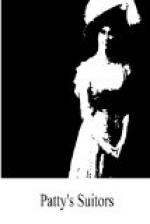Patty dropped a butterfly kiss on Nan’s brow, and then pirouetted across the room to her writing desk.
“Shall I begin, ’My Dear Suitor’?” she said, and then giggled to see the shocked look on Nan’s face.
“It wouldn’t matter; he would understand,” she said, carelessly, “but I think I can do better than that.”
“Well, I’ll leave you to yourself,” said Nan; “not out of special consideration for your comfort, but because it doesn’t interest me to watch anybody write letters.”
“By-by,” and Patty waved her hand, absentmindedly, as Nan left the room.
Then she applied herself to her task.
“Most Courteous Knight,” she began; “The flowers are beautiful,—and they are saying lovely things to me. They say they are fresh and young and green. Oh, my goodness! I forgot that you said they were speaking for you! Well, then, they are saying that they are just the sort I like, and they are sure of a welcome. With many, many thanks, I am very sincerely yours, Patricia Poppycheek Fairfield.”
And then Patty dismissed her Knight from her mind, and turned her attention to other matters. That afternoon about five o’clock, Mr. Cameron called.
“I scarcely hoped to find you at home,” he said, as Patty greeted him in the drawing-room.
“It isn’t our day,” she returned, “but I chanced to be in, and I’m glad of it. Nan, may I present Mr. Cameron?” And Nan accorded a pleasant welcome to the visitor.
“You see, Mrs. Fairfield,” Cameron said, “I rarely go into society and I fear my manners are a bit rusty. So if I have come to call too soon, please forgive me.”
His smile was so frank and his manner so easily correct, that Nan approved of him at once. She was punctilious in such matters, and she saw, through Kit’s pretence at rustiness, that he was not lacking in etiquette or courtesy.
“Let’s have tea in the library,” said Patty; “you see, Mr. Cameron, we always invite people we like to have tea in there, rather than in this formal place.”
“That suits me; I want to be considered one of the family, and what’s the use of wasting a whole lot of time getting up to that point? Let’s make believe we’ve always known each other.”
So tea was served in the library, and a very pleasant informal feast it was.
Mr. Fairfield came in, and soon the whole quartette were chatting gaily as if they had always known each other.
Mr. Cameron was especially interested in Patty’s club called “Happy Saturdays.”
“It’s the kindest thing I ever heard of,” he said, enthusiastically. “It does good to people who can’t be reached by any organised charity. I don’t want to intrude, Miss Fairfield, and I don’t want to exploit myself, but if you ever give your Saturday friends a little musicale or anything like that, I’d jolly well like to play for you. I’ll play popular stuff, or I’ll play my best Sunday-go-to-meeting pieces, whichever you prefer.”




